
| Unit | Reading aloud | Testing your ears | |
| 1 p1 | Home and family 职业与个人 | Poem Dreams | Family |
| 2 p15 | Life experience 职业与个人 | Poem Reply toBai JuyiWhom I Metfor theFirstTime ata Banquet inYangzhou | Life experience |
| p29 | A sense of calling and duty 职业与个人 | Poem I Travelled Among UnknownMen | Socialresponsibilities |
| p43 | Customs 职业与个人 | Poem Thinkingof MyBrothers on Mountain-Climbing Day | Languages and customs |
| 5 p57 | Travel and tourism 职业与环境 | Poem DoYou Fear the Wind? | Travel |
| p71 | Seeking a job and career 职业与个人 | Poem On theStorkTower | Jobsandcareers |
| p85 | Human relationships 职业与社会 | Poem The Arrow and the Song | Human relationships |
| p99 | Smart machines and people's lives 职业与社会 | Poem SeeingMengHaoran off atYellowCraneTower | Technologicaldevelopment |
| Opening your mouth | Viewingtogether | Voice of China |
| Extendinginvitations | Video dip Roundtable | Videodip The family portrait |
| Having meals | Videodip Capturing experiences in photographs | Videodip A culinary tour of China's night markets |
| Inquiring about arrangements | Videodip WhatcanwelearnfromChina? | Video dip The torch in my heart |
| Making room reservations | Vide Foreign students learning how to make zongzi | Videodip ChinesefolkloreinLunarNew Year pictures |
| Reception and send-off | Videodip Is tourism destroying cities? | Videodip Chinesetravelersandtheirpoems ontheroad |
| Taking foreigners on a sightseeing tour | Video dip Four ways to enhance your career | Videodip Chinese rural vlogger's new country life |
| Jobinterviews | Videodip The science behind teenage friendships | Videodip Thecourtyardofharmony |
| Finding out about a company | Video dip Theethicaldilemmaof self-driving cars | Video dip China's four great inventions |
Home and f family

① Read the following poem aloud after the recording. Pay attention to the pronunciation, intonation, and rhythm.

1 coNVERSATIoNSListen to the two conversations.After each conversation,youwillhearsomequestions.Decideonthebestanswer to each question.Both the conversations and the questions will be spokenonlyonce.
Conversation1
1. A. A party with dancing. B. A dinner party. C. A big party. D. A tea party.
2. A. The Greens are their neighbors. B. The Greens are their relatives. C. The Greens are their teachers. D. The Greens are their colleagues.
Conversation 2
3. A. Playing football. 3 Playing basketball. C. Taking pictures. D. Driving cars.
4.A.Ata bank. B. At a basketball game. C. In a shop. D. In a photography studio.
5. A. A photographer. B. A driver. C. A basketball player. .A bank clerk.
Word bank
apparentadi显而易见的
backbonen.骨干,支柱
consumptionn.消费
flatlyadv.直截了当地
industrializationn.工业化
infantn.婴儿,幼儿
maternaladi母亲的
nurseryschooln.幼儿园
photographern.摄影师
photographyn.摄影,摄影术
retirementhomen.养老院
rushhourn.(上下班的)高峰时间,
交通拥挤时间seniorcitizenn.老年人,长者end up最终处于,到头来
PAssAGE Listen to the passage and fill in the blanks. The passage will be spoken twice.
y grandmother is 94 now. Her abilities L to see, hear, and walk have weakened, and it has become apparent that she can no longer take care of herself,so numerous 1) havebeenheld to discusswhat to do. We talked about sending her to a 2) , but that idea was quickly rejected. Although Grandma would be with more people of her own age, she would see less
of her famil and that would 3) Besides, there is a chance of poor 4) Mother flatly stated that since she had retired a month ago and wouldbe abletolook after Grandma, Grandma would not 5) in a nursing home. I admire my mother greatly for this decision. I think that my whole family willfeelbetterknowingthat Grandmawill be well taken care of.
3 PAssAGEListento thepassage and decideon thebest answer to each question. Both the passage and the questions will be spoken twice.
1. A. Because of the changing roles of men and women. B. Because of the development of science and industry. C. Because of the development of agriculture. D. Because of the development of education.
2.A.People need tobe ready to move atany time. B. People can't support many children. C. Children are eager to leave their home. D. People want to avoid family conflicts.
3.A.Smaller families. B. No families. argerfamilies. D. Broken families.
4.A Atwo-parent family with children. B. A family consisting of a man and a woman only. C. A single-parent family. D.Both B and C.
5. A. Families of the past. B. Families of the present. C. Families of the future. D. Families of the past, present, and future.
4 PASsAGES Listen to the two passages. Complete each of the answers with no more than three words. Both the passages and the questions will be spoken twice.
Passage 1
1. How many people are there in the family? There are people in the family.
2. Who is John? John is thechildren's
3. According to Mr. Clark, why does he go to work early in the morning? Hewantsto avoid
4. What does John do? He is a(n)
5.What kind of job does Mrs. Clark want to find? Shewantstofindthe sort of job as she did before her marriage.
Passage 2
1. Where do senior citizens in the U.S. tend to live nowadays? They tend to live in their own
2. What do senior citizens become more concerned with as they growolder? They become more concerned with their
3. What do some senior citizens have more time to do to enjoy theirlives? They have more time to
4. Why is the number of senior citizens in the U.S. increasing rapidly? Becausepeopleare thanbefore.
5. In what aspects are senior citizens gaining social influence? They are gaining social influence in both
5 NEWS REPORT Listen to the news report and decide on the best answer to each question. Both the news report and the questions will be spoken twice.
1. A. The growing spending power of new parents. B. The development of domestic maternal and infant care brands. C. The changes in consumer needs. D. The increasing birth rate in recent years.
2. A. About 32 billion yuan. B. Over 50 billion yuan. C.About 4.6 billion U.S. dollars. D. About 32 billion U.S. dollars.

3. A. They spend much money on their babies and young children. B. They want to give their children a better childhood than they've had. C. They expect their parents and grandparents to look after their babies and young children. D.They havehigher income than their parents.
Wordbank
boothn.展台,货摊delightedadi.愉快的,高兴的
SwanLake《天鹅湖》
Tchaikovsky柴可夫斯基(俄国作曲家)
Note that the expressions "How about..."and "What about.." are always followed by v.+ing.
Reading out
EXCHANGES Read the short conversations after the recording, then practice them with your partner.
M: I wonder if you'd like to go skiing this weekend. W: Oh, yes. I'd really love to.
I M: How about going bowling? W:Great!What time?
M: I'd like it very much if you could come to the exhibition next Saturday. W: It's very kind of you to invite me. I'll be there.
M: Would you be able to go to the movies on Saturday evening?
W: I'd love to, but I've got an appointment that day. CoNVERSATION MODELS Read the conversations after the recording.
Pay attention to the expressions related to extending invitations.
M: Hi, Helen.
W: Hi, Tony. How are you doing?
M: Not bad. Say Helen, are you doing anything tonight? Would you like to go out?
W: Sorry, I can't. I have to finish a project report.
M: Well, how about Sunday night? Are you doing anything then? W: No, I'm not. What are you planning to do?
M: How about going to see a movie? Iknow there is a new movie on. W: Oh, that's a good idea.
M: Great! What about having a pizza first?
W:Sure,why not?Where would you like to meet?
M: Shall I pick you up at your house?
W: OK. What time?
M: Is 7{:}00 p.m OK?
W: Fine. Well, see you then.
M: Bye.
M1: Hello, this is Sam Johnson. May I speak to Mr. Zhang?
M2: Speaking. How are you, Mr. Johnson?
M1: Fine, thank you. And you?
M2: I'm fine, thanks.
M1: I'm calling to tell you that there will be an exhibition here next month. Would you like to come?
M2: Thank you for telling me. When exactly?
M1:From the21sttothe 25th.
M2: Will you be attending?
M1:Of course.And we would be delighted if you could come to visit our company's booth.
M2: That sounds nice. Thank you very much.
M1: My pleasure. I'll send you an invitation letter soon and I look forward to your visit.
M2:I'llbe there.


We use slightly different invitation phrases depending onwhomwe aretalkingto. What differences do you noticebetween the first conversation(withafriend) and thesecond conversation (with a business associate)?

In English, we often use "Shall we..." when we want to suggest something.It invites the other person to agree, but provides them with space for their personal preferences. Try to use it when you want to plan things!
Speaking up
I cONVERSATION 1 Complete the conversation, then listen to the recording and check your answers.
M: Hello, Mary. There is a concert at the National Concert Hall this Sunday. I have two tickets. 1) to go with me? W: Sounds good. 2) music will they perform? M: Mainly 3) . They'll perform Tchaikovsky's Swan Lake.
W: Wow! I like that very much.
M: Me too. It's really beautiful.
W: 4) does the performance start?
M: It starts at 7:00 p.m.
W: Where shall we meet then?
M:5) outside theHall?
W: Fine with me. I'm looking forward to it now.

Languagenotes
nephew,niece,lookafter
· Would you like to watch the game with me? · I'd like to, but I'm afraid I can't/won't be abletomake it.
. It's a pity you can't come.
· We can hang out together next time.
2coNVERSATION2Act out a conversation based on the clues.
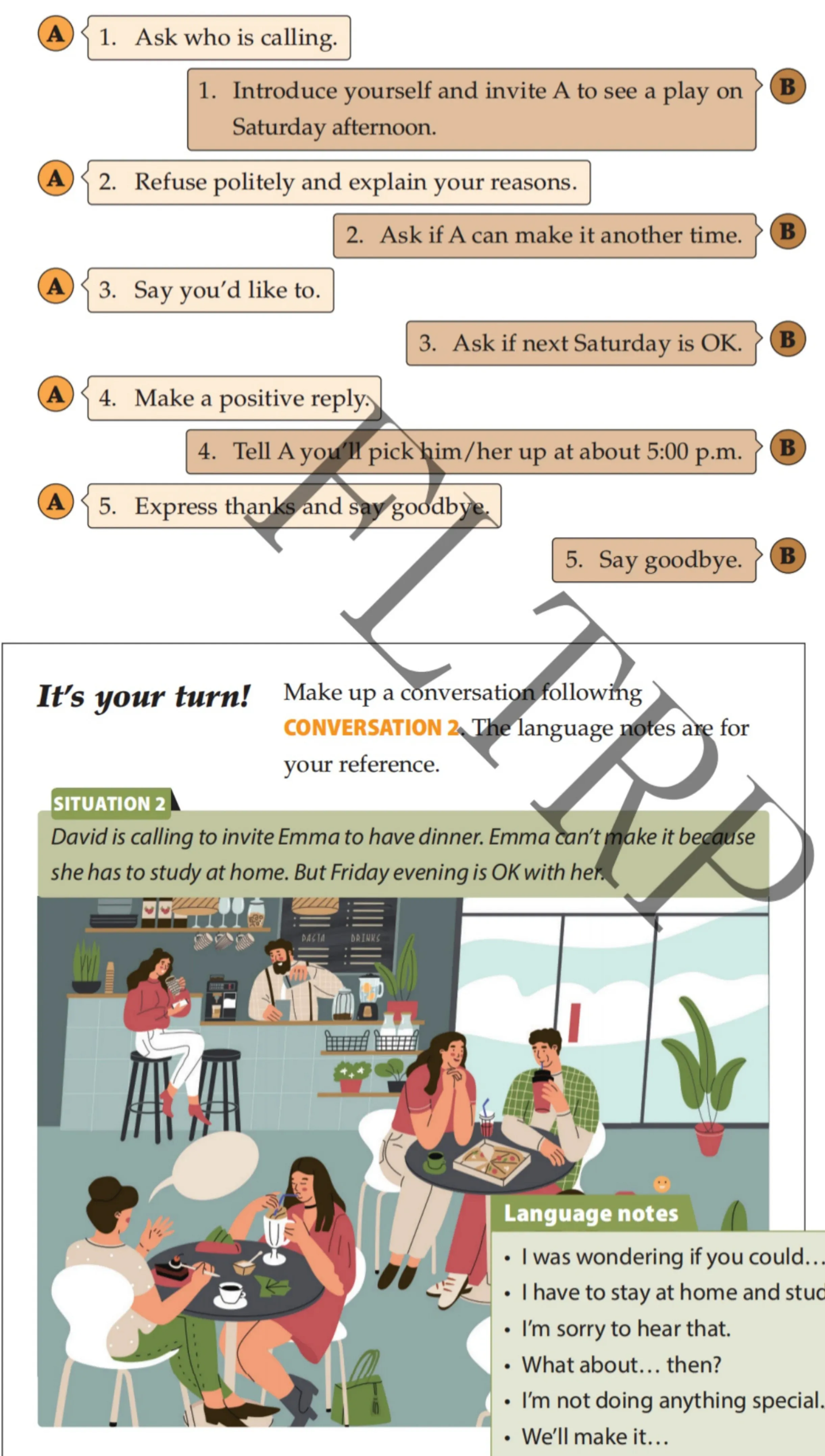
Make sure you react to what your partner says in an appropriate way. If they accept your invitation, you can say "Great!"or "'m glad you can come."If they decline, you can say"That's toobad."

Language notes
· settle down, take care of the arrangements, explore the fair, pick sb.up ·. I'm wondering if you have time to...
·May I take the opportunity to invite you to...?
·Iwanttoinviteyoutocomealong!
· Is there any other time that you might be available?
· Perfect, the time works for me.
Looking forward to...in the nearfuture./See you at..
Acting out
LISTENING Listen to the conversations.Match each conversation (shortenedas \mathbf{\Psi}^{\prime\prime}\mathbf{C}^{\prime\prime}] toa picture,thenlisten again and complete the table. Finally, practice the conversations with your partner.

1 SPEAKING Work in groups. Take turns inviting your group members to do something. They can either accept or politely decline your invitations.
Language notes
· have dinner together, play tennis, go to a concert, go camping, visit a museum,watchamovie,exploreafair
·Are you free?
. Would you like to...?/Why don't we...?
·Yes, I'd love to!Thanks forinviting me!
. I'm afraid I can't. I have to...
. It's a pity that you can't make it.
· What time would be more convenient for you?
· I will be free after my examination.
. What time shall we meet?
·Where shall we meet?
· Let's meet at...
Wordbank
affectionateadi.充满深情的
artisticadi.美术的,艺术的
attachmentn.喜爱,依恋
crouchv.蹲伏
deceasedadi.已死亡的,亡故的
epicadj.史诗般的,宏大的
grown-upn.成年人,大人
hide-and-seekn.捉迷藏
mourningn.(因某人去世而感到的)哀悼
negotiationn.谈判,协商
reunitev.重聚
sensationn.感受,感觉
sentimentn.感情,观点
sustain v_{\ast} 保持,使持续
unfold v_{\ast} 展现,呈现
marriagevow婚姻誓约 statebanquet国宴
Before viewing
|WARM-uPWhen it comes to the topic of"home and family,”what memoriescometoyourmind?Canyoudescribethemindetail?
IrememberthetimewhenI...

While viewing
MAIN IDEA Watch the video clip and check (\checkmark) the correct answers to the following questions. There may be more than one answer to each question.
1. According to the speaker, what does the round table symbolize?
A. Family reunion. B.Chinese festivals.
C. Sentiment to families D.Attachment tofamilies.
2. What can be solved over a round table in China in the speaker's opinion?
A. The marriage vows between loving couples.
B. The mourning of the deceased.
C. The negotiations between business partners.
D. A state banquet for the president from another country.
3.What does the speaker see as being the significance of a round table to the Chinese people?
A. Chinese people's tolerance of different people.
B. Chinese people's willingness to embrace different cultures and arts.
C. Chinese people's care and love and respect for their family, community,nation,andeventhewholeworld.
D.Chinesepeople'sfood on theround table.
4. How does the speaker summarize the history of the Chinese nation?
A. It has been a history of affectionate memories.
B. It has been a history of epic migration.
C. It has been a history of families.
D. It has been the stories of looking for or running to the round table to which Chinese people belong.
3 DETAILs Watch the video clip again and complete the sentences with what you hear.

After viewing
PROJECT Which of the following three pictures best represents your personal understanding of family? Give a speech on the topic.

Word bank
amongstprep..在...当中
anticipationn.期望,期待
festive adi.节日的,欢庆的
instructv.指导,教授
kinshipn.亲属关系
photographn.照片
portraitn.肖像
repayv.报答
reputationn.名誉,名声
lockin锁定,将....锁住
IO UNDERSTANDING Watch the video clip twice and match each moment captured in a family portrait to the significance that people attach to it.

1. "Harmony in the family leads to prosperity in all undertakings ( 家 和万事兴)." How do you understand this Chinese saying? Why is family an important concept for the Chinese?
2. Could you share with your classmates some family photos and tell the stories behind them?
Language notes
· Personally, I think this saying means that...
. This Chinese saying is about...
· In Chinese culture, the concept of family is important because...
Family harmony means that society will..
. This is one of my favorite family photos because...
. Can you guess when this photo was taken? . There is an interesting story related to this photo.
This photo reminds me of a time when.../This photo makes me think of..


Home and family.

Life experience.
Seeking a job and career. .12

Human relationships 14
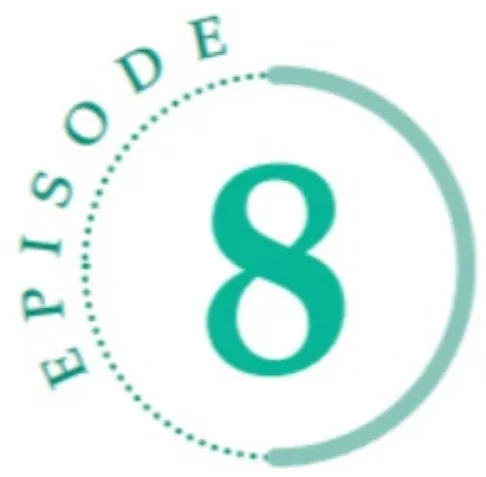
Smart machines and people's lives.... 16
Exercises. 18
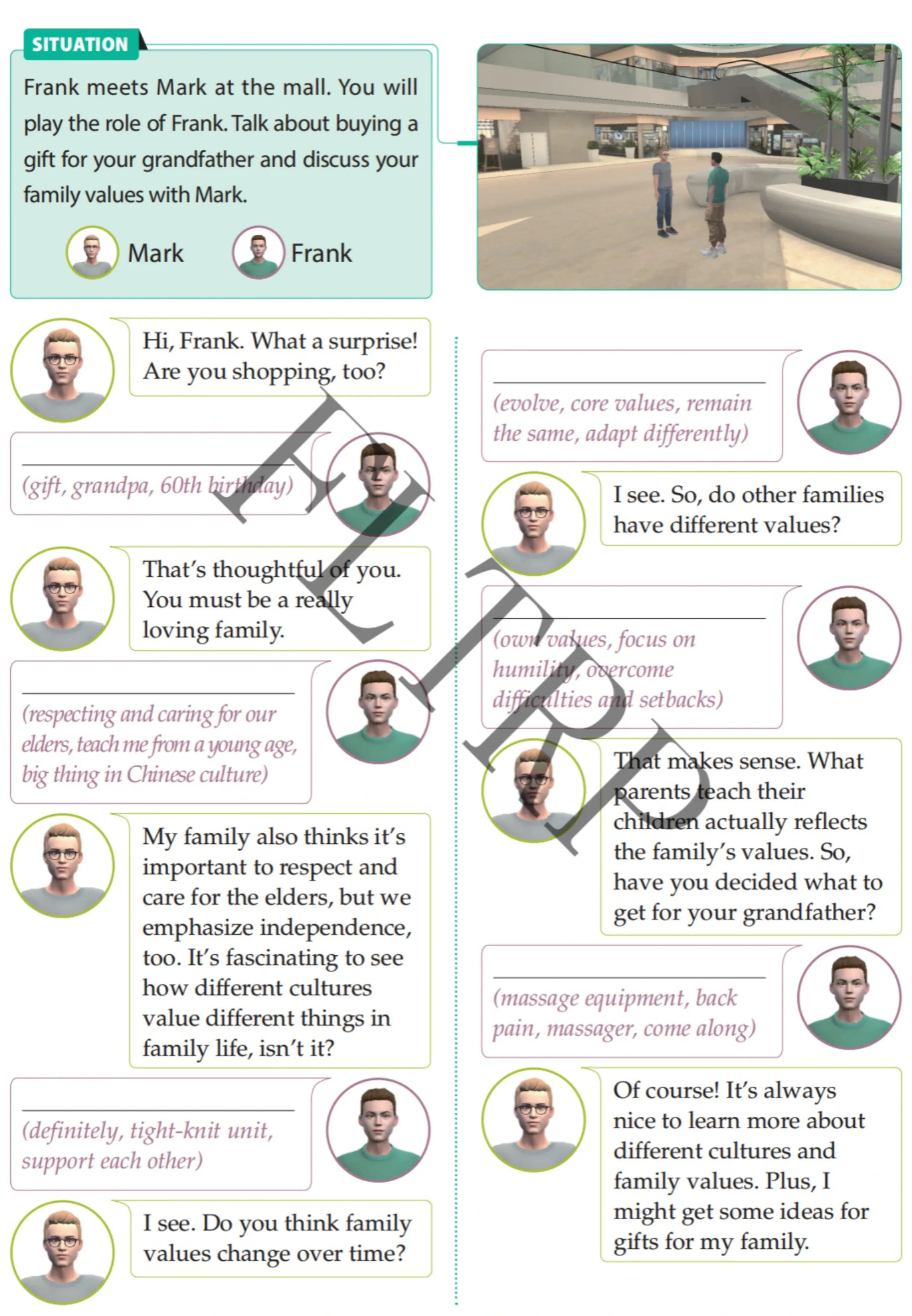
Conversation model
M: Hi, Frank. What a surprise! Are you shopping, too?
F: Hi, Mark. Yeah, I'm looking for a birthday gift for my grandpa. We're celebrating his 60th birthday next Week.
M: That's thoughtful of you. You must be a really loving family.
F: Absolutely. Respecting and caring for our elders has always been very important for us. My parents taught me this from a young age. It's also a big thing in Chinese culture.
M: My family also thinks it's important to respect and care for the elders, but We emphasize independence, too. It's fascinating to see how different cultures value different things in family life, isn't it?
F: Definitely. In China, family is seen as more of a tight-knit unit, and we learn to support each other.
M: I see. Do you think family values change over time?
F: Yes, they can evolve, but the core values often remain the same. And every family adapts differently to changing lifestyles.
M: I see. So, do other families have different values?
F: Yes, every family has its own values. For instance, some families may focus on humility, while others emphasize teaching their children to overcome difficulties andsetbacks.
M: That makes sense. What parents teach their children actually reflects the family's values. So, have you decided what to get for your grandfather?
I'm considering some massage equipment. My grandpa often has back pain, so a massager would be great. Would you like to come along?
M: Of course! Its always nice to learn more about different cultures and family values. Plus, I might get some ideas for gifts for my family.
Word bank
independence n.独立,自主
tight-knitadi.紧密团结的,关系密切的
evolvev.逐步演变
humilityn.谦逊,谦恭
setbackn.阻碍,挫折
comealong(和某人)一起去





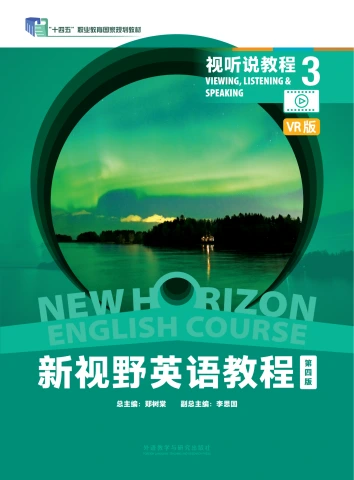

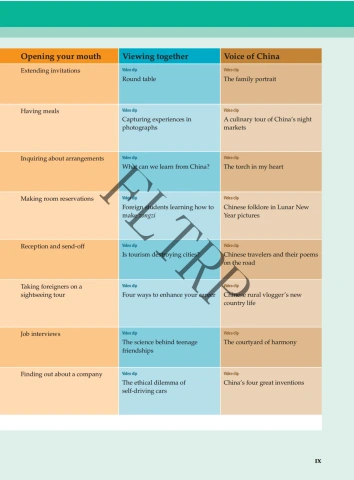
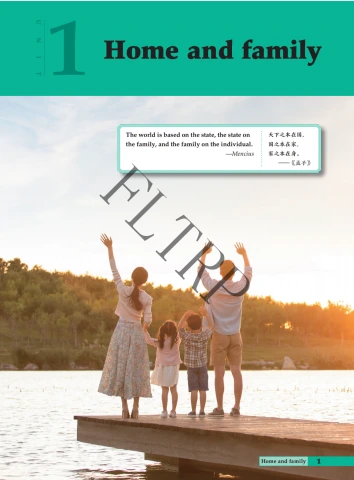

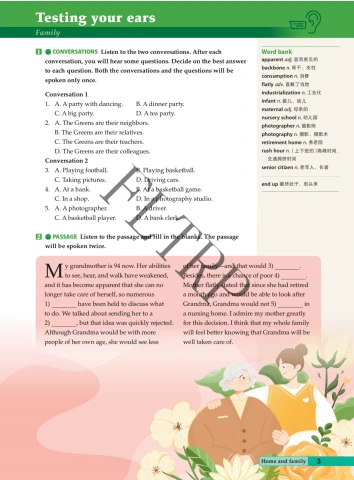
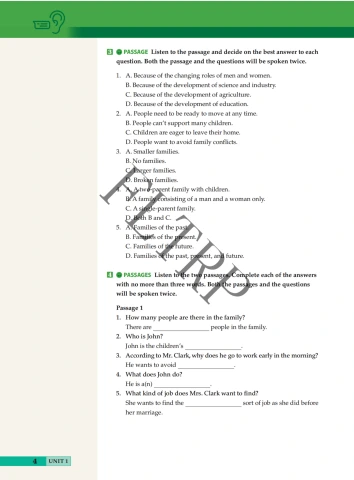
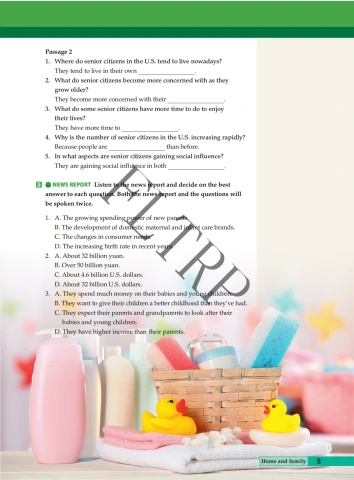

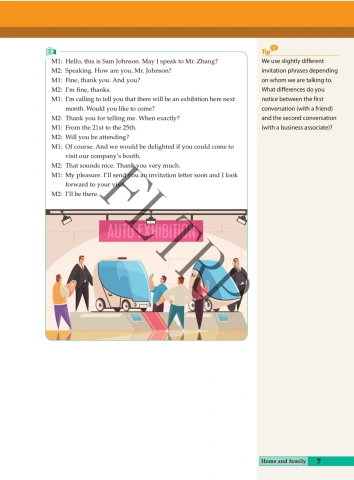


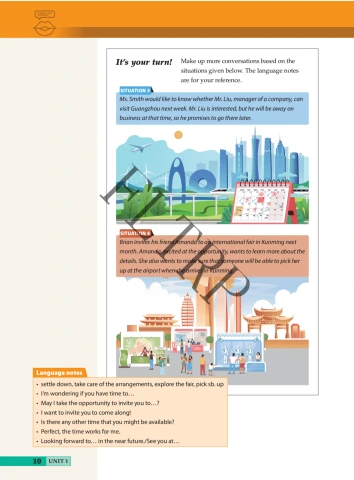
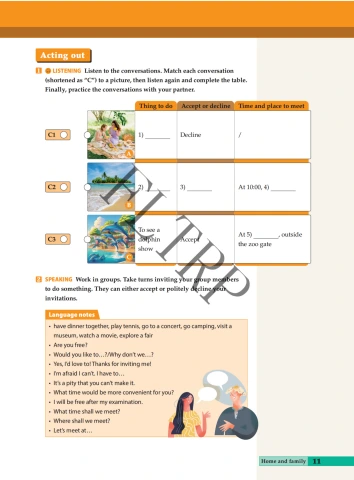
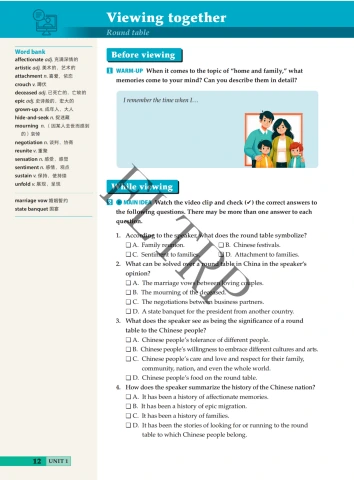

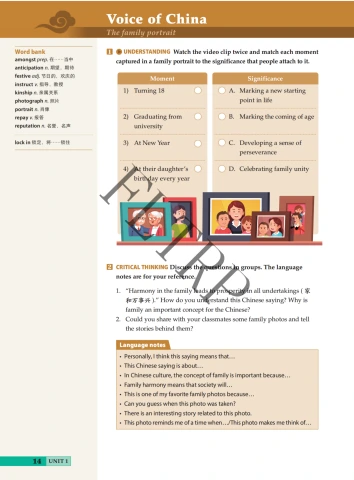
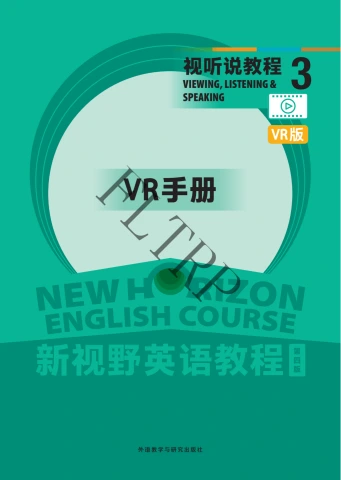
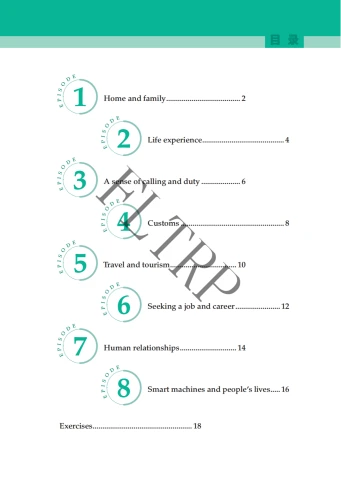


 该页无缩略图
该页无缩略图



